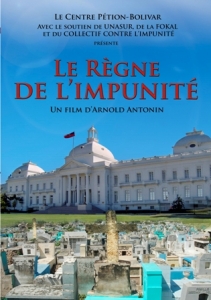Past Events. In French, English and Creole
November 14, 2014:
Impunité et perte de mémoire
Alrich Nicolas
Les péripéties du processus démocratique en Haïti ont placé au centre du débat national des interrogations sur la justice, la violence dictatoriale, le combat contre l’impunité, l’appel à la réconciliation et au pardon. Ces interrogations ne peuvent être discutées dans leur complexité sans que la question de notre rapport à la mémoire ne soit abordée. Ce travail de mémoire est d’autant plus important aujourd’hui que se développent deux tendances majeures dans notre société. L’une qui, au nom de la démocratie à construire, appelle à un nouveau départ, à la réconciliation et fait sans s’en rendre compte la part belle à l’impunité et absout les anciens bourreaux sans exiger leur repentance. Et l’autre qui peine, en butte aux mécanismes d’oblitération de la mémoire en œuvre depuis toujours dans la societe haïtienne, à rappeler les souffrances des victimes de la dictature face à une jeune génération, fatiguée du rappel du passé, et qui prône le degré zéro de la mémoire.
La conférence portera sur les mécanismes d’oblitération de la mémoire comme stratégie de perpétuation de l’impunité et tentera de montrer comment le poids du silence sur les violences passées nous condamne à l’éternel retour de la dictature, au règne de l’impunité et à l’affaissement de la justice.
This conference is part of the Impunity, Responsibility and Citizenship Seminar series.
It is co-sponsored by The Henri Peyre French Institute, the Center on Philanthropy and Civil Society, and the Ph.D./ M.A. Program in Political Science at The Graduate Center of CUNY.
October 20, 2014:
The Travesty of Justice
Michèle Duvivier Pierre-Louis
Haiti’s justice system functions in such paradoxical ways that it appears to reinforce impunity. Overcrowded jails are costly to maintain on an already tight budget while pretrial detention affects close to 90% of the prison population. Official executive rhetoric constantly reaffirms the independence of the judicial system when at the same time interference from Government and Parliament can free or detain defendants depending on their political ties. For the past twenty five years there has been an ongoing reform of the system on which millions are spent on international experts to review codes and procedures but with practically no results, while judges and prosecutors remain poorly trained, underpaid and subject to temptations and pressure by alleged criminals.
What are the causes of such a persistent situation in times of dictatorship or of “democratic transition”? What is the meaning of “the rule of law” under such circumstances? What is the meaning of justice for a historically marginalized majority?
May 2, 2014:
Haïti Hors-la-loi
Laennec Hurbon
Disparity between Haitian Law and state decisions and actions. The State against Society. Historicity. Reception and effect.
Lecture and discussion
Speaker: Laennec Hurbon
April 4, 2014:
Haiti Impunity: A Visual Account
Curator: Jasmine Narcisse
An interdisciplinary seminar organized by The Henri Peyre French Institute
The HPFI / Graduate Center, CUNY / 365 Fifth Avenue / New York, NY 10016 / 212-817-8365
Digital Exhibit and Projection
Curator and commentator: Frantz Voltaire
•Photos, documents and artefacts. Launching of the digital exhibit on the Henri Peyre French Institute website.
•Projection of the documentary film “Le règne de l’impunité” by Arnold Antonin.
March 12, 2014:
Rendre compte. Demander comptes.
Michèle Montas
J-P Richard Narcisse
Paths and Voices for Justice and Catharsis in Haitian Literature.
Round Table
